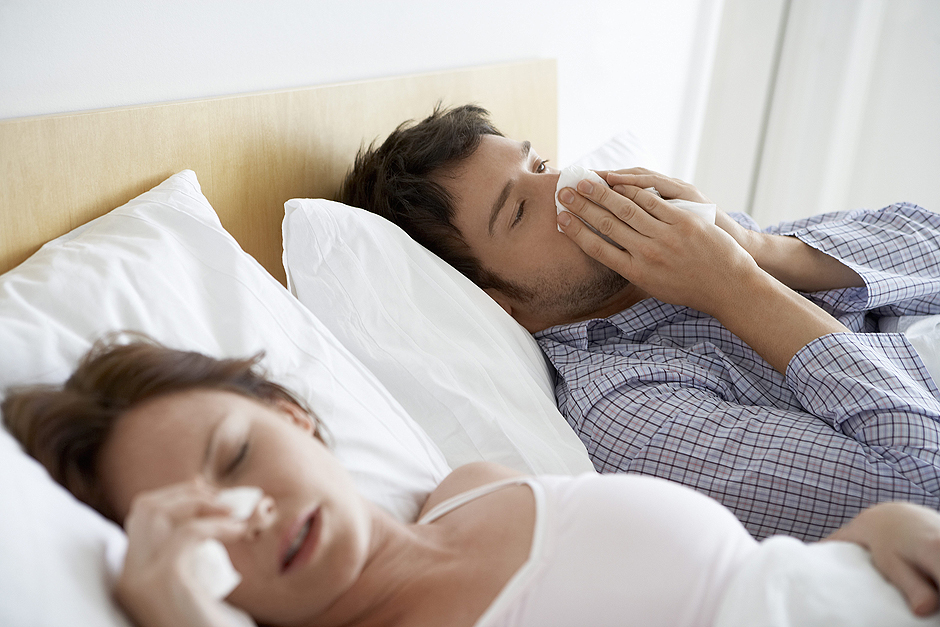He’s depicted as lying in bed, covered in used tissues, cough syrup and self pity. The flu is infamous for bringing a grown man to his knees.

Simply put, men are wimps when it comes to influenza. But does science support the “man flu” theories?
Earlier this week, new research suggested that estrogen – the primary female sex hormone – helps to stave off the replication of flu viruses in the cells found in women’s noses. The cells in men’s noses didn’t appear to have same protective shield.
Headlines read, “Man flu? It’s a fact,” “Man flu is actually a thing, says science,” and “Proof at last that man flu is real.” They suggested that the science props up men’s claims that their flu is, indeed, more potent.
But don’t give men a free pass just yet. Canadian doctors say the findings don’t have anything to do with “man flu” and that the jury’s out on which sex is crippled more by the illness.
READ MORE: How do you treat the common cold? Here’s what works and what doesn’t
For starters, the study – out of Johns Hopkins Bloomberg School of Medicine – only studied cells taken from nasal passageways and placed in a test tube. The cells were then exposed to influenza viruses under specific conditions.
- Naloxone-resistant street drug linked to 9 deaths in Eastern Canada seized in Alberta
- ‘She gets to be 10’: Ontario child’s heart donated to girl the same age
- Buzz kill? Gen Z less interested in coffee than older Canadians, survey shows
- Bird flu risk to humans an ‘enormous concern,’ WHO says. Here’s what to know
With those limitations, it’s hard to say if these findings would be replicated in human studies. We can’t say if influenza would manifest the same way in humans and their immune systems as these cells in a dish, according to Dr. Dan Riccuito, an infectious disease specialist and lead of infection prevention and control at Lakeridge Health.
READ MORE: Public bathroom hand dryers ‘splatter’ germs everywhere, research suggests
All the study simply suggests is that estrogen may have antiviral effects in damping down viral replication in women, Riccuito says.
“This is all in a test tube so it’s very far away from using it clinically to treat patients,” warned Dr. Michael Gardam, chief of infectious disease control and prevention at the University Health Network in Toronto.
But the findings are fascinating and pave the way to understanding how gender differences play a role in fighting disease.
READ MORE: Got the flu? Stay home and bosses, don’t ask for sick notes
“We’re learning there are true biological differences in the way men and women respond to infectious disease. The science on this is still in its infancy,” according to Dr. Danuta Skowronski, a University of British Columbia professor who also leads the B.C. Centre for Disease Control‘s department of influenza and emerging respiratory pathogens.
Men vs. women: here’s what we know
In a battle of the sexes, it’s a mixed bag when it comes to determining which gender is stronger and stealthier when it comes to disease.
Women consistently end up with the shorter end of the stick when it comes to certain influenzas. Think of H1N1 and avian flu – both took their toll on women who got sicker than their male counterparts, Riccuito said.
While women may be easy targets when it comes to flu, men tend to fare worse when it comes to infectious diseases as a whole, Gardam suggests.
READ MORE: 5 ways to protect yourself from the flu
They deal with higher hospitalization rates and higher mortality rates.
But it’s unclear why. In the past, men typically smoked more, had higher rates of heart disease and other lifestyle factors that could play a role.
“That’s been shown for decades. But you have to be careful before you say it’s due to X and Y chromosomes, though,” he suggests.
But it waxes and wanes, Skowronski says. Prepubescent boys have a higher risk of asthma. When enterovirus spread through the Western world, it was young boys who over-represented the virus’ victims.
READ MORE: Everything parents need to know about enterovirus
After puberty, the roles reverse and women end up with higher asthma rates. Pregnant women, across the board, do worse with influenza and other diseases.
“The sex differences aren’t consistent and not simple. There’s complexity and change across a lifespan,” Skowronski said.
So where did this “man flu” notion come from? Riccuito says men could have a higher inflammatory response as their immune systems kick in to fight the flu. That results in worse symptoms. But that’s speculation, he says.
“It’s this sexual stereotype that men get sick and they’re wimps and whine and complain to their spouses,” Gardam says.
“But we don’t nearly have enough information to base anything on it,” he said.
READ MORE: 6 vaccination myths debunked
Skowronski says men shouldn’t count themselves out yet either. Perpetuating the stereotype only stalls the research from moving forward.
“Stereotypes have no place in science. It’s oversimplifying and we could miss some signals that could help both sexes,” Skowronski said.
Read the full study published this week in the American Journal of Physiology – Lung Cellular and Molecular Physiology.
carmen.chai@globalnews.ca
Follow @Carmen_Chai






Comments